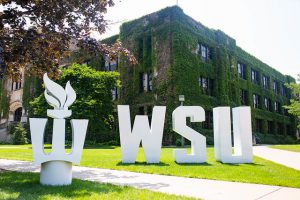 Winona State University has been recognized as among the “Best in the Midwest” for the 16th consecutive year in The Princeton Review’s annual “2020 Best Colleges: Region by Region.”
Winona State University has been recognized as among the “Best in the Midwest” for the 16th consecutive year in The Princeton Review’s annual “2020 Best Colleges: Region by Region.”
To compile its 2020 report, the Princeton Review evaluated 656 colleges nationwide that were considered to be academically outstanding and worthy of consideration in a college search. WSU was among 158 institutions selected for the “Best Midwestern” category.
The Princeton Review ranking also incorporates survey data from students attending Winona State, who weighed in on aspects of the student experience, from academics to campus life.
Comments from WSU students are featured in the Winona State profile on The Princeton Review website. Some highlights include:
On Academics:
- Winona State offers a “quality education that is affordable.” As one student puts it, “we may be a small school, but we do great things.”
- Students praised WSU for “preparing students for the workplace” by helping them develop career relevant skills “while still encouraging them to be innovative.” The large nursing and education programs underscore what some students describe as WSU’s educational prerogative: “to help students gain the necessary skills to help us go out and make an impact upon the world.”
- Small class sizes “allow professors to get to know their students on a more personal level” and “professors work hard to be available” outside of class time. “They honestly do care about their students,” one student explains, “and they are always there to connect [students] with what they need” from class material to “finding jobs and internships.”
On Student Body:
- Winona State students are “very friendly and passionate about their education and ambitions,” and “most students are willing to help each other.”
- Robust club offerings and extra-curricular activities allow students to get involved across campus and engage in learning outside their major areas of study. Examples cited included computer science students joining the creative writing club, English students running the video game club, and non-music majors participating in the symphonic wind ensemble.
- Students say they value and seek out diverse perspectives and experiences. “All seem to be like a family here at Winona and can come together as our own little community.”
On Campus Life:
- Winona embraces the outdoors, and students can conveniently find “three disc golf courses in the city, two golf courses,” as well as fishing on the Mississippi River, rock climbing and hiking throughout the local bluffs, and “two lakes with paved paths” where people run and bike. In the winter the bluffs offer ice climbing, “cross country ski trails” and “the lake is cleared off to ice skate.”
- Students enjoy “WSU’s very nice/fairly new wellness center,” the Integrated Wellness Complex, “which features an indoor running track, weightlifting equipment, and other exercise equipment.”
- Many students also say that volunteering through clubs or weekly volunteer opportunities on campus is popular among students. “For such a small student body compared to many other universities,” one student explains, “Winona State has a large social impact on the surrounding area and many of the clubs and organizations are extremely good at what they do.”
Founded in 1858, Winona State University is a comprehensive, regional public university with approximately 8,000 students on campuses in Winona and Rochester. Almost half of WSU students are first-generation, meaning neither parent has a four-year bachelor’s degree.
The oldest member of the Minnesota State system, WSU offers more than 80 undergraduate, pre-professional, licensure, graduate and doctorate programs in five colleges: Business, Education, Liberal Arts, Nursing & Health Sciences, and Science & Engineering.
Winona State is ranked as the second public institution in Minnesota by U.S. News & World Report’s “Best Colleges” and has been featured as one of America’s 100 Best College Buys for quality and value for 23 consecutive years. The University generates $447.9 Million in economic impact for the region per year.
The University’s mission is to enhance the intellectual, social, cultural and economic vitality of the people and communities we serve: a community of learners improving our world.
For more information, visit Princeton Review or call University Communications at 507-457-5024.

I have just read all the great news about my old school—what a nice write-up. Yes, I attended when we almost shut down for lack of students – the few girls danced together in old Ogden Hall, records playing for the music. Got a good education and taught for many years. Fantastic to see how it has all grown and ranks way up at the top of GOOD schools. Enjoyed reading “all about it”. Jean Zamboni(class of 1948!)